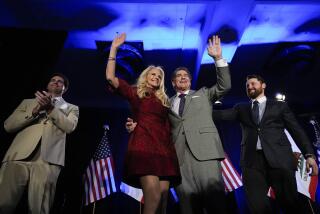State Legislator Who Sought Earlier Primary Sets New Goals
- Share via
SACRAMENTO — The Fresno lawmaker who pushed for years to get California voters into the thick of the presidential nomination process by moving the primary from June to March said this week he will work for more far-reaching reforms after this month’s balloting.
A more rational system would be to have five regional primaries nationwide, said state Sen. Jim Costa (D-Fresno), who began working for an earlier primary when he was in the Assembly in the early 1980s.
Lacking some national reform, California should move its presidential primary to the first Tuesday in March, he said in an interview Tuesday.
Costa finally won passage in 1993 of a bill that moved the primary, on a one-time experimental basis, to the fourth Tuesday in March for the 1996 elections, or March 26.
But if Costa had had his way in 1993, California would have voted Tuesday rather than three weeks from now.
“I think for California voters, [Tuesday] could have been a tremendous opportunity,” Costa said, noting that residents of 10 other states held primaries and caucuses.
But other lawmakers balked, saying it was too early. They forced him to compromise. Still, Costa said, it is better than sitting on the sidelines until the first week of June and watching the rest of the nation settle the national parties’ nominating battles before any Californian gets near a polling booth.
“I still think that we have the potential of clinching the nomination, if Dole does well in the next two weeks,” Costa said, referring to Kansas Sen. Bob Dole.
Democrats also will vote March 26, but President Clinton has no significant opposition to nomination for a second term.
Unless California adopts new legislation, the state’s primary will revert to June.
“Hopefully, while this is still fresh in people’s minds, we can next year evaluate the impact this has had and what changes we might make for 2000,” Costa said.
One change Costa favors is to cluster the primaries into five regional voting days, in the Northeast, South, Midwest, Rockies and the far West.
The elections would be held three to four weeks apart. All candidates would be forced to campaign in each region for a relatively sustained period, giving voters a better chance of watching the contenders and comparing them, he said.
The dates of the primaries would be rotated every four years so that no region would be the first to vote each presidential year, he said.
Such a change would probably require an act of Congress and the support of both major political parties, Costa said.
The last time California played a decisive role in the nominating process was 1964 for Republicans and 1972 for Democrats. California’s decision in 1993 to move its primary helped trigger a rush of states to the front of the primary trail.
“I predicted that if we thought New York and Pennsylvania and other states were going to remain on the sidelines, we were kidding ourselves. I thought many of those large states would move their primaries and that’s what happened.”
A key part of Costa’s proposed election reform is to separate the presidential and state primaries and have balloting for state offices, members of Congress, the Legislature and many local offices held in September.
That provision was killed by opponents who objected to the additional cost of holding three statewide elections rather than two in presidential years, an estimated $30 million to $40 million.
For this year, the state primary also will be held on March 26, more than eight months before the November general election.
From 1912 through 1940, California held separate primary elections in presidential years. The presidential primary was in early May and the state balloting was in late August.
About 20 other states have separate presidential and state primaries, Costa said.
A shorter general election campaign would significantly cut the cost of running for office in California, Costa said.
“A lot of men and women would love to run for office, but don’t have the ability or luxury to campaign for six months out of the year,” he said.
More to Read
Get the L.A. Times Politics newsletter
Deeply reported insights into legislation, politics and policy from Sacramento, Washington and beyond. In your inbox twice per week.
You may occasionally receive promotional content from the Los Angeles Times.










